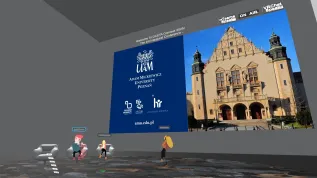
The prestigious British University of Cambridge offers Polish Studies since 2014. Lecturer in Polish Studies Dr. Stanley Bill and Vice-Chancellor of the University of Cambridge Prof. Leszek Borysiewicz talk to PAP about the course and its success.
"Polish Studies at Cambridge have three main pillars. The first is teaching Polish history and culture to British students, the second - research on Poland, and the third is a special events program for a wider audience" - described in an interview with PAP Dr. Stanley Bill, lecturer in Polish Studies at Cambridge University.
Prof. Sir Leszek Borysiewicz (Welsh of Polish origin), Vice-Chancellor of the University of Cambridge, explained that although Polish Studies was launched only a year ago (in 2014), it has already become the most popular course at the department. "We are surprised by the success of these studies" - said the rector.
Dr. Bill teaches a one-year course "Introduction to the Language, Literature and Culture of Poland". "During this time, students learn about the entire Polish history and culture - from Mieszko to Masłowska" - the lecturer revealed.
"Before each lecture I present various songs - rock, hip-hop, the latest Polish music so that the students are in contact with contemporary Polish culture from the very beginning" - said Dr. Bill. He added that even if the materials discussed during the lecture concern the Polish-Lithuanian Commonwealth, before the lecture he plays, for example the song "Jestem Bogiem" by Paktofonika.
He noted only one of his students has Polish roots. Students are Brits, who are interested in Poland. "Poland is a major country in the eastern part of the EU. And the culture of Poland is visible on every corner in the UK. After all, there are about 800 thousand Poles in Great Britain" - he said and added: "For my students it is quite a natural decision that they want to learn Polish".
He described that the Polish-Lithuanian Commonwealth is an extremely interesting topic for the students who take his course. "This is a huge surprise for them that such a huge state existed 500 years ago" - said Dr. Bill. He noted that the values of this country were democracy, tolerance, diversity, equality, the ideals that are still important in contemporary Europe.
As part of the Polish Studies the university organizes conferences and meetings devoted to Poland for a wider audience. For example, a major conference on Polish-Ukrainian relations and the future of these relations in view of the two countries\' sometimes difficult past has already been organized. There was also a lecture by Prof. Norman Davies on the Anders Army, a meeting on Bruno Schulz, and a forum dedicated to the situation of Poles in the UK. There was also a poetry reading with Adam Zagajewski.
Dr. Bill explained that the existence of Polish Studies at Cambridge benefits Poland, too. "First of all, we are able to change the narrative of Poland and improve the image of Poland abroad by disseminating reliable knowledge about the country. You have to remember that the level of knowledge about Poland abroad is often quite low and narratives are often skewed" - he admitted.
Cambridge Polish Studies was launched in 2014 thanks to four sponsors: the Foundation for Polish Science, the Grabowski Foundation, the University of Cambridge, and the Zdanowicz Foundation. These institutions provided funding in the amount of £340 thousand, which ensures the functioning of the centre until 2018. Additional funds are needed to ensure the program continuation. The Foundation for Polish Science has initiated the process of raising an endowment to ensure the centre’s financial stability and future development.
Dr. Bill is Australian born in the UK, he does not have Polish roots. He first came to Poland during his studies. He worked in a private school in Bielsko-Biała as an English teacher. He started to learn Polish in his free time. After graduation he returned to Poland, studied at European Studies at the Jagiellonian University, and then worked at the Jagiellonian University and the Pedagogical University in Krakow. He defended his PhD dissertation on the work of Czesław Miłosz at Northwestern University (USA).
PAP - Science and Scholarship in Poland, Ludwika Tomala
lt/ agt/ zan/
tr. RL













